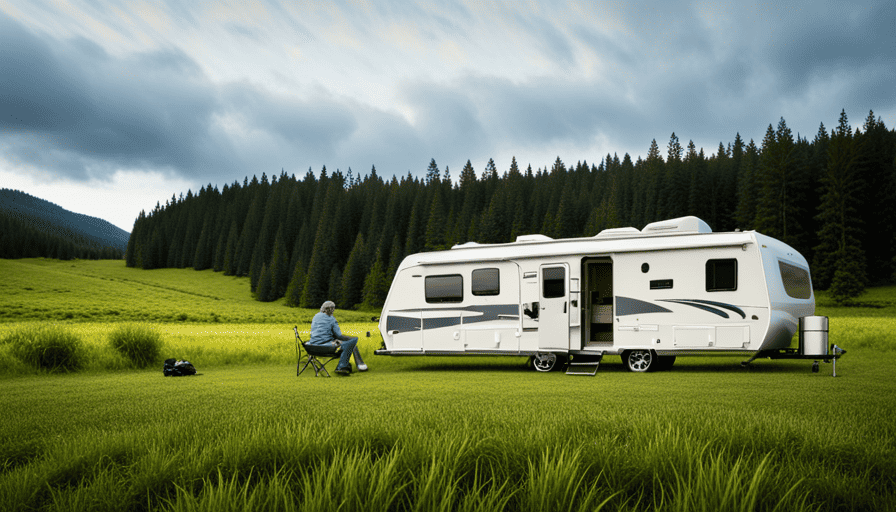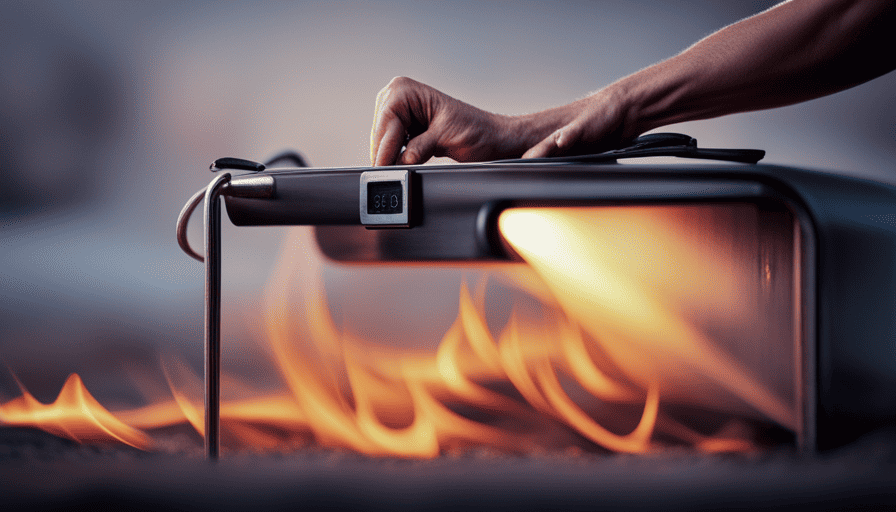Thinking about starting your own journey on the open highways? A camper serves as the ideal partner for your adventures, offering you the liberty to discover the wonders of nature while maintaining the luxuries of home. However, what’s the first step in purchasing a camper from a private seller? Worry not, because I’m here to guide you through it.
In this informative guide, I’ll walk you through the process of purchasing a camper from a private seller, ensuring you make a wise and informed decision. From researching different models to considering financing options, inspecting the camper’s condition, and verifying legal documents, I’ll provide you with all the necessary steps to make your camper dreams a reality.
So, let’s hit the road and dive into the world of buying a camper from a private seller!
Key Takeaways
- Research different camper models and types, such as pop-up campers, travel trailers, fifth wheels, and motorhomes
- Determine your budget and explore financing options for purchasing a camper
- Compare camper listings online and offline, and inspect the condition and maintenance history of the camper before making a decision
- Verify ownership and legal documents, consider getting a pre-purchase inspection, and finalize payment using a secure method
Research Different Camper Models and Types
Before diving into the world of camper buying, it’s essential to research and explore the multitude of camper models and types available in order to make an informed decision that perfectly suits your outdoor adventure needs.
There are numerous different camper brands to choose from, ranging from well-known manufacturers like Airstream and Winnebago to smaller, niche brands that offer unique features and designs. Each brand has its own strengths and weaknesses, so it’s important to carefully consider the pros and cons of each before making a decision.
In addition to different brands, there are also various types of campers to consider. These include pop-up campers, travel trailers, fifth wheels, and motorhomes. Each type has its own advantages and disadvantages.
Pop-up campers are lightweight and easy to tow, but they often lack the amenities of larger models. Travel trailers offer more space and amenities, but they require a tow vehicle. Fifth wheels provide even more space and stability, but they require a specialized hitch and a pickup truck. Motorhomes are the most convenient option, as they combine living and driving spaces, but they can be more expensive and harder to maneuver.
Once you have researched the different camper models and types, you can then move on to determining your budget and financing options.
Determine Your Budget and Financing Options
To figure out how much you can afford and explore financing choices, start by determining your budget and examining various payment options. Setting a budget is crucial when buying a camper from a private seller. Consider your income, expenses, and any additional costs associated with owning a camper, such as insurance and maintenance. This will help you determine the maximum amount you can comfortably spend on a camper without straining your finances.
Next, explore financing options that can help you purchase the camper. If you have enough savings, you may choose to pay for it in cash. However, if you need assistance, there are several financing choices available. You can opt for a personal loan from a bank or credit union, which allows you to borrow a specific amount to buy the camper and repay it over a set period with interest. Another option is to consider dealer financing, where the seller may offer a financing plan. Be sure to compare interest rates, terms, and conditions to find the best option for your situation.
Once you have determined your budget and explored financing options, you can confidently search for camper listings online and offline. This will give you a better idea of the campers available within your budget and help you find potential sellers.
Search for Camper Listings Online and Offline
As you embark on your quest for the perfect home away from home, dive into the vast ocean of camper listings both online and offline, where a treasure trove of adventure awaits. When searching for a camper, it’s important to explore both online and offline options to ensure you find the best fit for your needs. While online listings provide convenience and a wide range of options, don’t overlook the benefits of exploring offline camper listings as well.
Offline camper listings can be found in local newspapers, community bulletin boards, and even at local RV dealerships. These listings often offer a more personal touch and the opportunity to directly interact with the seller. Meeting face-to-face allows you to ask questions, negotiate the price, and potentially even test drive the camper before making a decision.
To help you compare the different options you come across, consider using the following table:
| Online Camper Listings | Offline Camper Listings |
|---|---|
| Wide selection | Personal interaction |
| Convenient | Negotiation potential |
| Detailed information | Test driving |
| User reviews | Local expertise |
| Price comparisons | Immediate availability |
By exploring both online and offline camper listings, you can gather a comprehensive understanding of what’s available in the market and make an informed decision. Once you have found a few promising options, it’s time to inspect the camper’s condition and maintenance history.
Inspect the Camper’s Condition and Maintenance History
Get ready to dive into the exciting adventure of inspecting a camper’s condition and maintenance history, ensuring that your dream home away from home is in top-notch shape!
When it comes to buying a camper from a private seller, it’s crucial to thoroughly inspect the condition of the vehicle. The importance of camper maintenance can’t be overstated, as it directly affects the longevity and functionality of the camper. Look out for any signs of wear and tear, such as rust, leaks, or damage to the exterior. Additionally, check the interior for any signs of water damage, mold, or pests.
To gain a better understanding of the camper’s maintenance history, don’t hesitate to ask the seller a few questions. Inquire about the frequency of maintenance and repairs, as well as any major upgrades or replacements that’ve been done. It’s also important to ask if the camper’s ever been involved in any accidents or if it has any outstanding recalls.
By thoroughly inspecting the camper’s condition and maintenance history, you can make an informed decision before making a purchase. Once you’ve gathered this information, you can then move on to test driving the camper and checking for any issues.
Test Drive the Camper and Check for Any Issues
Before embarking on the exciting adventure of test driving your potential home away from home, hop behind the wheel to feel the wind in your hair and the freedom of the open road. Test driving a camper is crucial to ensure that it meets your expectations and is in good working condition.
It allows you to experience how the camper handles on the road, check for any potential issues, and ensure that everything is functioning properly. During the test drive, pay attention to how the camper accelerates, brakes, and handles turns. Listen for any unusual noises coming from the engine or any vibrations that may indicate mechanical problems.
Test all the features and appliances, such as the air conditioning, heating, plumbing, and electrical systems, to make sure they are in good working order. Additionally, keep an eye out for any signs of water damage or leaks, as these can cause significant problems down the line. Check the tires for wear and tear and inspect the exterior and interior for any signs of damage or poor maintenance.
By test driving the camper and identifying any potential issues, you can make an informed decision about its condition and whether it is worth pursuing further. Now, let’s move on to the next step: negotiating a fair price with the seller.
Negotiate a Fair Price with the Seller
Once you’ve thoroughly inspected the camper and test driven it to ensure it meets your expectations, it’s time for you to engage in a fair negotiation with the seller to determine the final price.
Negotiating a fair price is crucial when buying a camper from a private seller. Here are some tips to help you navigate this process effectively:
-
Do your research: Before entering into negotiations, gather information about the market value of similar campers. This will give you a better understanding of what’s a fair price.
-
Start with a reasonable offer: Begin the negotiation with a price that’s slightly lower than what you’re willing to pay. This allows room for counteroffers from the seller.
-
Be patient and flexible: Negotiations may take time, so be patient during the process. Also, be open to compromise and willing to adjust your offer if needed.
-
Keep emotions in check: It’s important to approach the negotiation with a calm and rational mindset. Emotional reactions can hinder effective communication.
-
Maintain open and respectful communication: Clearly express your needs and concerns while listening to the seller’s perspective. Respectful communication fosters a positive negotiation environment.
Once you have successfully negotiated a fair price, it’s important to verify the camper’s ownership and legal documents to ensure a smooth transaction.
Verify the Camper’s Ownership and Legal Documents
After successfully negotiating a fair price, it’s crucial to ensure a smooth transaction by verifying the owner’s documents and legal paperwork of the camper. Checking ownership and legal documents is essential to avoid scams and fraud.
By verifying the paperwork, you can ensure that the camper is not stolen and that there are no title issues or hidden liens. This step is crucial to avoid legal complications down the line.
To start, ask the seller for the camper’s title and registration documents. Verify that the name on the documents matches the seller’s identification. Look for any signs of tampering or alterations on the paperwork. Additionally, check if the camper has any outstanding loans or liens by requesting a lien release letter from the seller.
To further protect yourself, consider conducting an online search to ensure that the camper’s VIN (Vehicle Identification Number) matches the documents provided. This can help you verify the camper’s history and identify any potential issues.
By thoroughly checking the ownership and legal documents, you can avoid buying a stolen or encumbered camper and ensure a clear title. This will help you avoid any legal complications in the future.
Once you have verified the paperwork, you can then consider getting a pre-purchase inspection by a professional to ensure the camper’s overall condition.
Consider Getting a Pre-Purchase Inspection by a Professional
Ponder procuring a pre-purchase inspection from a proficient professional to ascertain the overall condition of the potential purchase. Opting for a pre-purchase inspection can provide numerous benefits when buying a camper from a private seller.
One of the key advantages is that it allows you to gain a comprehensive understanding of the camper’s condition beyond what is visible to the naked eye. A professional inspector possesses the necessary expertise to identify any underlying issues or potential problems that may not be easily detectable. This insight can save you from unexpected repairs and expenses down the road.
Hiring a professional inspector is of utmost importance in ensuring a thorough evaluation of the camper. These experts have a trained eye and know what to look for during the inspection process. They can assess the structural integrity, electrical systems, plumbing, appliances, and other crucial components. Additionally, they may also inspect the chassis, tires, and exterior for signs of damage or wear. By relying on their expertise, you can make an informed decision about whether the camper is worth the investment.
As you finalize the sale and transfer ownership, it’s essential to keep in mind the insights gained from the pre-purchase inspection. This information can guide your negotiations and help you make an informed decision about the purchase.
Finalize the Sale and Transfer Ownership
Before finalizing the sale and transferring ownership, it’s crucial to consider the insights gained from the pre-purchase inspection and let them guide your decision-making process. Here are some important things to keep in mind during this stage:
-
Finalizing payment: Ensure that the payment method is secure and agreed upon by both parties. It’s best to use a traceable form of payment, such as a cashier’s check or bank transfer, to protect yourself from any potential scams or fraudulent activities.
-
Transferring registration: Contact your local Department of Motor Vehicles (DMV) or relevant authority to understand the process of transferring the registration of the camper. You will likely need to provide the necessary documentation, such as the bill of sale and the title, to complete the transfer.
-
Obtain a release of liability: This document protects you from any legal responsibility associated with the camper after the sale. It’s important to have the seller sign it to ensure a smooth transition of ownership.
-
Update insurance coverage: Before hitting the road, make sure to contact your insurance provider and update your policy to include the newly purchased camper. This will ensure that you’re adequately covered in case of any accidents or damages.
By following these steps, you can successfully finalize the sale and transfer ownership of the camper. Now, let’s move on to the next stage and ensure proper insurance and registration for the camper.
Ensure Proper Insurance and Registration for the Camper
Make sure you have the appropriate insurance coverage and registration in place for your new adventure vehicle, so you can hit the road with peace of mind. When buying a camper from a private seller, it is crucial to ensure that you meet the insurance requirements and complete the registration process correctly. This will protect you financially and legally in case of any unforeseen circumstances.
Before purchasing a camper, it is essential to research insurance options specific to recreational vehicles. Look for insurance policies that provide coverage for both accidents and damages. Additionally, consider adding coverage for personal belongings inside the camper and any attached accessories. Compare different insurance providers to find the best coverage and rates for your needs.
Once you have chosen an insurance provider, you will need to provide them with the necessary information about the camper, such as its make, model, and VIN number. They will guide you through the process of obtaining insurance for your new camper.
In terms of registration, each state has its own requirements and procedures. Typically, you will need to provide proof of ownership, such as a bill of sale, and complete the necessary paperwork at your local Department of Motor Vehicles (DMV). They will issue you a registration and license plate for your camper.
By ensuring proper insurance coverage and completing the registration process correctly, you can enjoy your new camper without any worries on the road. Remember to consult with insurance professionals and follow your state’s guidelines for a smooth and hassle-free experience.
Frequently Asked Questions
Can I finance a camper purchase from a private seller?
Yes, you can finance a camper purchase from a private seller. There are various financing options available for buying a camper, including loans from banks, credit unions, and online lenders. To qualify for a loan, you’ll generally need to meet certain requirements such as having a good credit score, providing proof of income, and submitting details about the camper you intend to purchase.
It’s important to compare loan terms and interest rates to find the best financing option for your camper purchase.
What are the legal requirements for transferring ownership of a camper?
To transfer ownership of a camper, there are legal requirements and a paperwork process that must be followed.
These include obtaining a title transfer form from the state’s department of motor vehicles, completing the form with accurate information about the buyer and seller, and signing it.
Additionally, some states may require a bill of sale, proof of insurance, and payment of any applicable taxes or fees.
It’s important to consult your local DMV for specific requirements in your area.
Should I get a pre-purchase inspection done if the camper looks well-maintained?
Oh boy, let me tell you, skipping a pre-purchase inspection for a seemingly well-maintained camper is like playing Russian roulette with your wallet!
Sure, it may save you some time and money upfront, but the risks involved are no joke. Without an inspection, you could be blindsided by hidden issues that could cost you a fortune down the road.
However, if you’re feeling lucky and willing to take the risk, there’s a chance that everything might turn out just fine. It’s a gamble, my friend!
How can I ensure that the camper I’m buying is not stolen?
To ensure that the camper I’m buying is not stolen, I would first ask the seller for documentation regarding camper ownership and registration. This includes the title, registration certificate, and any relevant bills of sale.
I would carefully examine these documents for inconsistencies or signs of tampering. Additionally, I would verify the information with the appropriate authorities, such as the local DMV or law enforcement agencies.
Taking these steps can help ensure a legitimate and legal purchase of a camper.
What are the insurance options for a camper purchased from a private seller?
When purchasing a camper from a private seller, it’s important to consider RV insurance and coverage options. RV insurance provides protection for your investment and can cover damages, theft, and liability.
Coverage options may include comprehensive coverage, collision coverage, and liability coverage. It’s crucial to thoroughly research and compare different insurance providers to find the best policy that suits your needs and budget.
Conclusion
In conclusion, buying a camper from a private seller can be an exciting and rewarding experience. Throughout this process, I’ve learned the importance of thorough research, careful inspection, and proper documentation.
Just like embarking on a new adventure, purchasing a camper requires preparation and attention to detail. It’s like setting sail on a sea of possibilities, where each camper holds the potential for unforgettable memories and incredible journeys.
So, take the plunge, do your homework, and find that perfect camper to embark on your own personal voyage. Safe travels!










